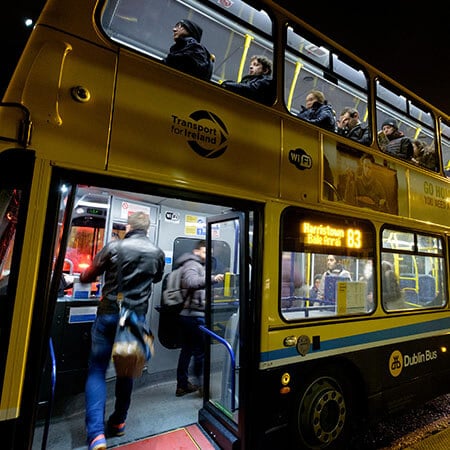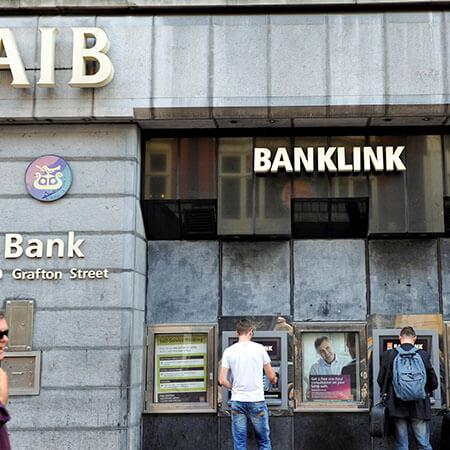There’s no way around it, Dublin is expensive. But with a bit of savvy budgeting and careful planning, it is affordable. Here, we provide an overview of the cost of living for students in the city. So, if you’re planning to study in Dublin, you should be able to gauge exactly how much it will cost.
Expenses associated with getting settled
Your biggest outlays are likely to come just after you arrive in Dublin. As you establish yourself in a new home, you’ll have to pay some hefty fees upfront. So make sure you have enough money to cover these initial expenses.
Temporary accommodation
You may need to stay in a hostel or guest house while you look for a place to rent.
A rental bond
This is a security deposit paid at the beginning of your rental contract. There are no legal guidelines as to how much a rental bond should be, but it’s not unusual to have to pay the equivalent of one month’s rent. Generally, this will be returned at the end of your tenancy.
Electricity, gas and broadband connection fees
Typically, your electricity and gas will already be connected when you move into a rented room or apartment. However, if you do need to have the electricity connected, Electric Ireland does it for a fee of €70. However, the fee from Gas Networks Ireland varies depending on the length of the connection.
A broadband connection may also be included in your rental agreement. If not, you’ll need to arrange this yourself. The upfront cost of setting up broadband in your home can range from nothing to over €200. This will depend on your provider, so it’s worth shopping around.
You can compare connection costs at the Commission for Communications Regulation. This a government agency that promotes pricing transparency for the industry.
Basic furniture and homeware
Many rented rooms and apartments in Dublin come furnished, but not all of them. If you need to buy furniture, there are secondhand furniture dealers across Dublin – many of which are run by charities.
The likes of Oxfam, Vision Ireland (formerly NCBI) and Age Action all offer furniture for a fair price and funds go toward good causes. They all have city centre locations too. The area around Camden Street and Francis Street in the Liberties is worth checking out.
However, you can also check out websites like Gumtree and Adverts.ie. Or, if you’re in the market for new furniture and houseware, you can check out the likes of Argos, IKEA and Bargaintown.
Student rent
Rent can vary widely between different types of accommodation. In general, sharing with others is cheaper than living alone. While living in an apartment is cheaper than a house.
No matter how you slice it though, this is likely to be your largest single expense. Because it is such a huge contributor to the cost of living in Dublin for students, it pays to give it some thought.
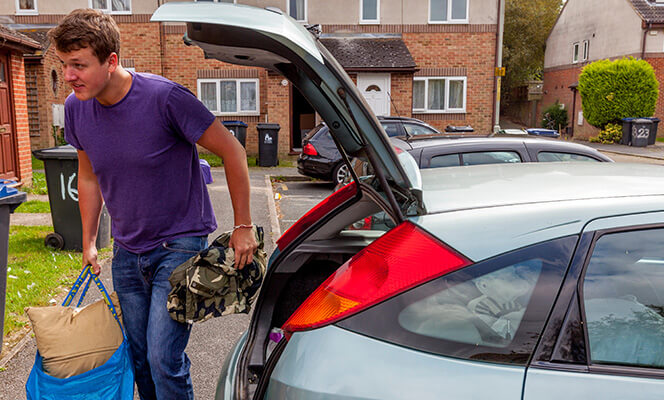
On-campus accommodation
Rental prices for on-campus accommodation differs between universities. These can range from €600 to more than €1,000 per month. Generally, they are charged as a lump sum each semester.
You can visit the relevant university’s site for the most up-to-date rates:
Off-campus accommodation
Sharing a room is probably your best bet for low-cost accommodation in Dublin. Numbeo, a crowd-sourced cost of living database, tracks the monthly rent of one and three-bedroom apartments around the city centre. According to its data, here’s what you can expect to pay right now:
- One-bedroom apartment (city centre) – €1,679
- One-bedroom apartment (outside of centre) – €1,405
- Three-bedroom apartment (city centre) – €2,935
- Three-bedroom apartment (outside of centre) – €2,261
Updated June 2021
You can find out more about in our comprehensive guide to finding student accommodation in Dublin.
Food costs
The good news is you’ll never need to resort to a ramen-only diet during your time in Dublin. Savvy shoppers can stock up on delicious, nourishing food at decent prices.
Supermarkets
There’s no shortage of supermarkets in Dublin. The big names include Supervalu, Tesco, Aldi, Lidl and Dunnes Stores. Unfortunately, there are no Irish websites that regularly compare grocery prices. However, you can find detailed, crowd-sourced prices at Numbeo and Expatistan for an idea of the prices you can expect to pay.
Convenience stores
If you need something late at night or in a hurry, Dublin is dotted with convenience stores. Naturally, they have a smaller range and higher prices than the supermarkets listed above. But they are handy and often have great deals on selected products. Keep an eye out for these names if you’re in a bind: SPAR, Centra, Londis, Mace, Gala, Costcutter and Applegreen.
Bills
Even if you move halfway across the world, bills will still be waiting for you when you arrive. Here’s the essential utility, phone and internet bills that add to the cost of living for students in Dublin.
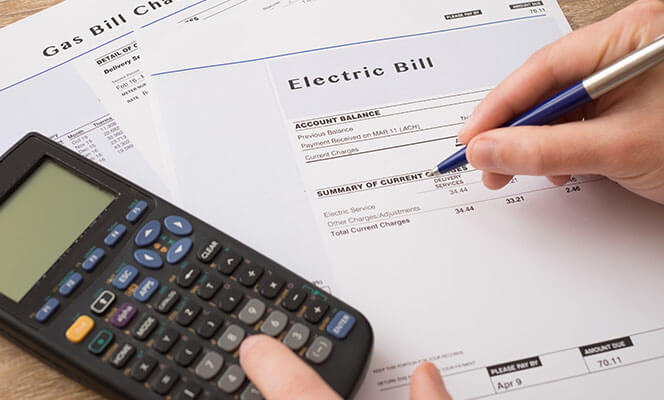
Basic utilities
Basic utilities include electricity, gas and garbage collection. However, you won’t have to pay any charges for domestic water use – unless you use excessive amounts.
Your utility bills will differ depending on your living arrangements. Sometimes a landlord will include these bills in the price of your rent. But more often, you will have to pay for these yourself or chip in with your roommates. Expatistan estimates that the cost of basic utilities for one person in a studio apartment in Dublin is around €85 per month.
You can find out more about the city’s system of bin collections and recycling in our guide to waste disposal in Dublin. When it comes to gas and electricity, it’s best to shop around for the best deals. Price comparison websites like Bonkers.ie and Switcher.ie are ideal for this.
Broadband costs
Once again, if you’re living with others you’ll be able to split your broadband bill. If you have to pay for it by yourself, it could cost you around €40 per month though. Once again, Bonkers.ie and Switcher.ie can help you find the best broadband deals. Although you can find more information in our guide to setting up utilities too.
Phone
There’s a huge range of mobile phone operators offering both pay-as-you-go and bill pay plans. Once again, comparison sites like Bonkers.ie and Switcher.ie are your go-to resources for finding the best mobile deals.
The cost of clothing in Dublin
Obviously, the price of clothes can vary greatly from store to store. Having said that, the mainstay of the student wardrobe – jeans and a top – is as good a yardstick as any.
At Irish department store Arnotts, a pair of women’s jeans start at around €50. While a casual top from H&M can range anywhere from €3 to €70.
But , if you love a bargain, drop into one of Dublin’s Penneys stores. This is what Dubliners call Primark – and the Mary Street branch is the flagship store for Primark’s entire European chain.
The cost of transport
Dublin is a relatively small city and it is completely possible to get around by bike or on foot. But if you have a long commute, here’s how public and private transport contributes to your cost of living as a student.
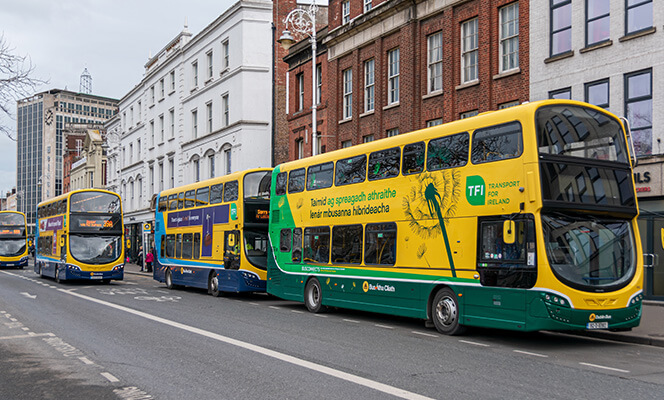
Public transport
Dublin’s public transport system is top class. However, it is also among the most expensive in the world. Having said that, students can slash their transport costs by buying a Student Leap Card. This allows you to use the city’s public transport system at a deep discount.
With this card, you’ll also receive student discounts at a bunch of fashion, food and entertainment outlets. If you’re savvy in using it, it can really bring down your cost of living as a student.
A Student Leap Card costs just €10 and you can load it with as much credit as you need to get around.
Car
You can pick up a reliable, secondhand vehicle for under €5,000 in Dublin. However, depending on your experience and age, insurance costs can be hefty. Motor tax rates also vary hugely depending on the amount of emissions your car produces. So it’s worth keeping this in mind when you’re on the hunt for a new car.
You’ll find more information about the costs of bike rental and taxi rides in our full guide to transport in Dublin.
Socialising
You’ve got a roof over your head, food on the table, broadband in the cables and a phone in your pocket. It’s time to celebrate!
If you’re heading for the pub, a pint of beer will cost around €5 or €6. Most pubs also offer non-alcoholic alternatives, so make sure to ask the staff what’s on offer. If you’re staying in, you can get your hands on a decent bottle of wine from as little as a tenner at your local supermarket or off licence.
Dublin restaurants range from inexpensive holes-in-the-wall through to sumptuous dining experiences. A good rule of thumb for eating out is the price of a McDonald’s Big Mac. (It’s even the basis for a popular price index that compares currencies). In Dublin, the iconic burger costs around €4.50. While dinner for two at a local pub will cost in and around €40. Three courses for two people at a mid-range restaurant will set you back €60 – €70.
But if you’re looking for great food at a reasonable cost, check out Dublin’s food markets. Many city centre eateries also offer a bring-your-own-wine option, which can really reduce the figure on your final bill.




